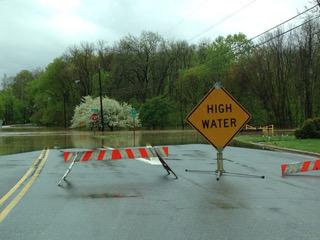Flooding is a pervasive problem across Maryland with reports showing it to be the most frequent and expensive natural disaster in the state. Climate change, development, and aging infrastructure have made the problem worse over the last several decades, with particularly devastating effects for socioeconomically vulnerable communities. To help combat this problem, University of Maryland Extension (UME) will partner with Maryland Sea Grant at the University of Maryland Center for Environmental Science (UMCES), and the National Oceanic and Atmospheric Administration (NOAA) to expand understanding and use of existing flood inundation mapping (FIM) tools, and implement a newly developed one to mitigate flood risk and improve preparation across the state.
Flooding and flood damage frequently affect minorities, low-income households, and other underserved communities because these populations are often located in low-lying, flood-prone areas, where services, improvements, and support have been minimal to nonexistent. Public awareness and disaster preparedness have been severely limited due to lack of social acceptance and access to tailored solutions. This three-year 750k project funded by NOAA's National Sea Grant College Program and National Weather Program Office will aim to increase public awareness, skills, and use of visualization and other tools to address the impacts of flooding and flood damage in an equitable manner. A Maryland Sea Grant Extension faculty member will be hired to serve as the project’s flood inundation mapping liaison and will work with affected communities and local, state, and federal agencies and organizations to integrate FIM tools into local planning efforts. The specialist will use social science - the study of human behavior and society - in their work to span organizational boundaries and connect stakeholders with solutions.
“We have made tremendous strides in the practice of social science with regards to managing our environment and natural resources,” said Bill Hubbard, Extension Program Leader for University of Maryland Sea Grant Extension and the project’s principal investigator. “Several methods have been demonstrated to be effective when partnering with communities to co-create solutions to big environmental, social, and economic issues such as flooding.”
Flooding takes many forms in Maryland, affecting both urban and rural regions: coastal areas along the shores of the Chesapeake Bay experience widespread high tide flooding, while metropolitan areas see frequent stormwater and riverine flooding. Several organizations and agencies have developed tools to aid with visualizing, planning, managing, mitigating, and responding to flooding and flood damage in the United States and Maryland, but many of these tools are underutilized by communities and local planning organizations. These include the Resilience Analysis and Mapping Tool (Federal Emergency Management Agency), Climate Change Vulnerability GIS Tool (Maryland Department of Transportation), and Advancing Stormwater Resiliency in Maryland initiative (Maryland Department of the Environment). This project aims to give new awareness to these tools and subsequently implement a new NOAA FIM tool with flooding visualizations for Maryland in the coming years.
Fredrika Moser, director of Maryland Sea Grant, says this project aligns closely with Maryland Sea Grant’s mission of reaching Maryland communities with science-based solutions. “This funding will provide additional capacity to serve Maryland constituents and strengthen resilience to flooding in communities across the state. We are eager to bring on an additional team member to complement and expand upon our organization’s work in the Chesapeake Bay watershed,” says Moser.

About Maryland Sea Grant Extension
Maryland Sea Grant Extension is a partnership between Maryland Sea Grant and University of Maryland Extension. Extension specialists focus on finding practical solutions to problems that affect Marylanders, and are experts in a variety of fields, including aquaculture, business, food safety, climate change, and watershed and Bay restoration. Our specialists facilitate workshops and training seminars, produce publications, and conduct applied research that can help solve problems. Learn more about Maryland Sea Grant Extension at www.mdsg.umd.edu/topics/extension/our-services.